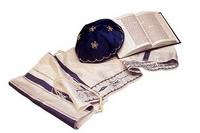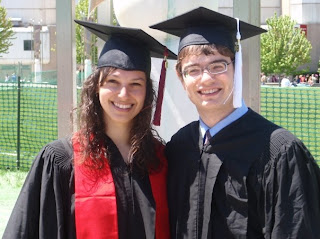
I just ordered "Good for the Jews" by Debra Spark. It's a modernized version of the story of Esther based in Madison, Wisconsin. It was published by the University of Michigan press and the author lives in Maine.


Not sure how I feel about this. Long story short, Tzemah Yoreh, son of Talmud scholars and assistant professor of Bible at American Jewish University in L.A., served in the Israeli army and wasn't impressed. He said the experience "destroyed my ardent Zionism" and made him an athiest.
Still committed to his Jewish upbringing, Yoreh decided to rewrite the siddur and drafted his own atheist-feminist version that eliminates God and Zionism from the mix.
I don't know I'd go as far as to call myself an atheist. I don't vehemently deny the existence of God, but I'm not really convinced either. One of my favorite things about Judaism is that its so strongly rooted in culture and tradition that a core belief in God isn't necessary to feel connected.
My boyfriend's sitting right next to me and I haven't showed him yet, but I know it'll make him cringe. He'll say changing century old traditions undermines the religion. Jeff and I feel pretty much the same way about God, but for him, Judaism is about keeping the same traditions as our ancestors and the other Jews around the world to stay connected to each other as a religion and a culture.
I understand that, but I don't completely agree with it. I think it's ok when we develop new tunes to prayers, or modify laws to keep up with the times.
I have a hard time respecting anyone's work in Judaism who doesn't support Israel, but Yoreh had kind of a cool idea. He said, “If you define [prayer] as communication between humans and a deity, I think that’s a very narrow conception. . . I think prayer is communal and private expression of hopes, fears, an appreciation of aesthetic beauty, good attributes. But that has nothing to do with God.”
I like that. I don't pray to God because it doesn't really do anything for me, but broadening the meaning of prayer might open things up a bit for people like me.
I think it'd be cool to read his siddur, but more as something to study than something to use in synagogue. In that sense I think Jeff's right. I may not believe in God, but having a God at the center of Judaism is part of the tradition and part of the culture that have defined so much of my life.


We all at least know someone who's done it. Where are you from? I'm from Canada, you say, hoping this will up your chance of getting accurate directions through Europe.
You don't say it because you hate America, or even because you're ashamed of it.
You say it because the international opinion of the United States, particularly in Europe, is frighteningly low. Granted it's better now that Obama is president, but as far as I can tell, not by much.
I was just as angry and frustrated as every other young liberal when Bush was president. I would point to stretch Hummer limousines and shake my head and say, that's what's wrong with America.
I would laugh at the ignorance of people who said it's our duty as citizens to support our president in any decision he made because he's the leader of our country. I still do. I think it's scary that people believe that.
But when it comes to Israel, I have always defended it. The government, the army and the citizens, even when I don't know the details of the action or event I'm defending. When people say bad things about Israel, I get flustered and angry and scared.
How does that make me any different than the unconditional Bush supporters I can't stand?
I asked my Israeli "sister," Meital, what the young adult political climate was like in Israel awhile ago. Meital lived with my family in Milwaukee in 2004 as part of the Young Emissary Program. I wrote about her for my first article during my internship at the Chronicle. We've seen each other several times since her stay, and she remains a close part of our family.
Basically, she told me young political life in Israel is a lot like it is here. There are a lot of people like me, herself included, who question what the government does and openly criticize it when they think it's done something wrong.
This didn't surprise me, but it made me wonder what the Israeli youth thought about their Jewish American counterparts who criticize the American government but never the Israeli one.
But then she said something that did surprise me. She told me that she becomes more defensive regarding her country when she's in someone else's. She was visiting me in Madison at the time and working in Puerto Rico, where she still is.
I realized that it's the same for me, though. The worst was when I was in London in the summer of 2006. There was anti-American propaganda everywhere, and oddly enough, I never felt more pride in my country.
Maybe when you're away is when it's most obvious how much hate is actually out there.
I've only been to Israel once, but for a number of reasons--particularly the Israelis in my life-- it feels like home.
Because of this, I am constantly on guard when it comes to Israel. I have no problem scrutinizing the country's actions in the company of other people, Jewish or not, who unconditionally believe in Israel's right to exist as a Jewish country, and I have no problem admitting to these people when I don't know enough to form a valid opinion.
But just as I would never say anything bad about the United States to someone who looks down on Americans as spoiled and inferior beings, I will continue to support Israel unconditionally in the face of people who don't think the Jews have a right to a homeland.
I've never actually told anyone I was from Canada, but I know people who have, and I guess I don't blame them. When it's dark and you're lost on another continent, sometimes it's just not worth risking it.
But a lot of times it is. I'm usually more of a cynic than an idealist, but I can't help but think that if young Jews, especially Jewish liberals, stood up more for their religion and their country, it wouldn't hurt.

Because I'm a Jewish vegetarian.
